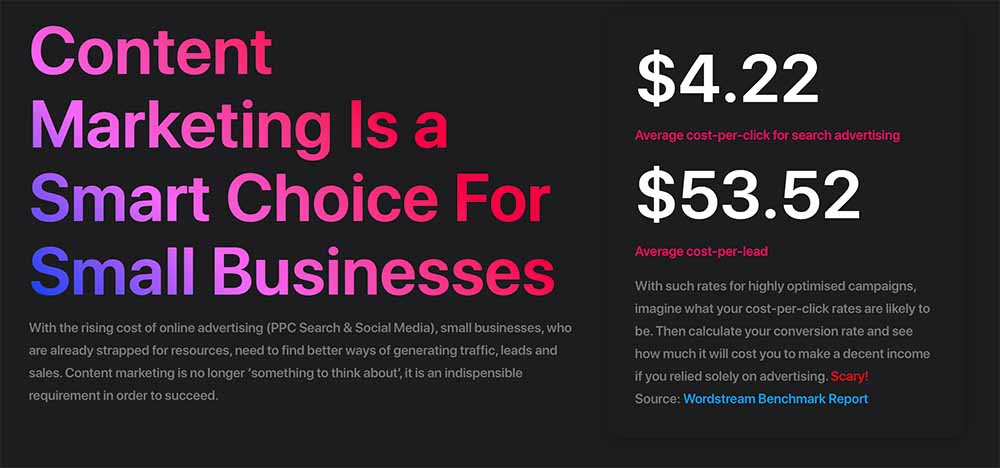
Small businesses face unique challenges in the digital landscape, particularly when it comes to standing out and reaching their target audience. In today’s competitive online environment, it’s essential for small businesses to implement the best content marketing practices to maximize their online presence and drive revenue. With the structure, scalability and accessibility afforded by the current AI content tools, implementing small business content marketing best practices is easier than ever before. This article explores the top strategies and tips for small business content marketing, with a focus on leveraging digital marketing, content creation, and marketing automation to achieve success.
Understanding the Importance of Content Marketing for Small Businesses
Content marketing is essential for small businesses in today’s digital landscape. It allows them to connect with their audience on a more personal level, building brand awareness and driving customer engagement. By consistently creating valuable and relevant content, small businesses can position themselves as industry experts and gain the trust of their target market. This trust is crucial for building long-term relationships with customers and ultimately boosting revenue.

Furthermore, content marketing provides small businesses with the opportunity to showcase their unique value proposition and differentiate themselves from competitors. By sharing their expertise and insights through various content formats such as blog posts, videos, and infographics, small businesses can effectively communicate their brand’s story and values, resonating with their audience on a deeper level.
Additionally, content marketing can significantly impact a small business’s online presence and visibility. By consistently publishing high-quality content that is optimized for search engines, small businesses can improve their website’s search rankings and attract more organic traffic. This not only helps them reach a larger audience but also increases the likelihood of converting visitors into leads and customers, ultimately contributing to the overall success of the business.
Utilizing Digital Marketing to Reach Target Audiences Effectively
Digital marketing offers small businesses a powerful platform to reach their target audiences with precision. By utilizing search engine optimization (SEO), small businesses can improve their online visibility and appear higher in search engine results, increasing the likelihood of potential customers finding their website.
Social media marketing allows businesses to engage with their audience on popular platforms, share valuable content, and build a community around their brand. Email campaigns are an effective way to directly reach potential customers, providing personalized content and promotions that can drive traffic to the business’s online platforms.
Creating High-Quality and Engaging Content for Maximum Impact
Creating high-quality and engaging content is a crucial aspect of small business content marketing. In today’s digital landscape, consumers are inundated with an abundance of content, so it’s essential for small businesses to produce content that stands out and captures the attention of their target audience. This can be achieved by understanding the needs and interests of the target market and tailoring the content to resonate with them. By doing so, small businesses can cultivate a loyal following and establish themselves as authorities in their respective industries.
Furthermore, creating content that drives meaningful interactions is key to the success of small business content marketing. Engaging with the audience through valuable and relevant content can foster a sense of connection and trust, ultimately leading to increased brand loyalty and customer retention. This can be accomplished through various content formats such as blog posts, videos, infographics, and social media posts, allowing small businesses to diversify their content and appeal to different audience preferences.
Ultimately, the goal of creating high-quality and engaging content is to generate leads and drive conversions for small businesses. By consistently delivering valuable and compelling content, small businesses can attract potential customers and guide them through the sales funnel. This can result in increased online visibility, brand awareness, and ultimately, revenue growth for small businesses, making it a critical component of their content marketing strategy.
Implementing Marketing Automation for Efficiency and Scalability
Implementing marketing automation is essential for small businesses looking to maximize their content marketing efforts. By utilizing marketing automation tools, small businesses can streamline their marketing processes, allowing for greater efficiency and scalability. This means that tasks such as email marketing, lead nurturing, and customer relationship management can be automated, freeing up valuable time and resources for small business owners and marketers to focus on strategic growth initiatives. With marketing automation, small businesses can ensure that their content reaches the right audience at the right time, leading to increased engagement and ultimately, higher conversions.
One of the key benefits of marketing automation for small businesses is the ability to nurture leads effectively. By automating lead nurturing processes, small businesses can deliver personalized content at scale, building stronger relationships with potential customers and guiding them through the sales funnel. This personalized approach can significantly improve the effectiveness of small business content marketing, leading to higher conversion rates and increased revenue. Additionally, marketing automation allows small businesses to track and analyze customer interactions, providing valuable insights that can inform future content marketing strategies and drive better results.
Furthermore, marketing automation enables small businesses to achieve greater scalability in their content marketing efforts. With automation in place, small businesses can easily scale their marketing campaigns to reach a larger audience without significantly increasing their workload. This scalability is crucial for small businesses looking to expand their online presence and grow their customer base. By implementing marketing automation for efficiency and scalability, small businesses can stay competitive in today’s digital landscape and achieve long-term success through their content marketing efforts.
Leveraging AI Technology for Content Creation and Optimization
Small businesses can harness AI technology to streamline their content creation process, saving time and resources while maintaining high-quality output. AI-powered tools can analyze data and trends to generate relevant and engaging content, ensuring that businesses stay ahead of the curve in their marketing efforts. By leveraging AI for content creation, small businesses can focus on other aspects of their operations, knowing that their marketing content is being handled efficiently and effectively.
In addition to content creation, AI technology can also optimize content for better performance. AI-powered tools can analyze audience behavior and preferences to personalize content, making it more relevant and engaging for the target audience. This personalized approach can significantly enhance the effectiveness of small business marketing efforts, leading to increased engagement, conversions, and ultimately, revenue. By leveraging AI for content optimization, small businesses can maximize the impact of their marketing content and stand out in the digital landscape.
Overall, AI technology offers small businesses the opportunity to elevate their content marketing efforts and deliver tailored experiences to their audience. By leveraging AI-powered tools for content creation and optimization, small businesses can enhance their online presence, engage their audience more effectively, and ultimately, boost their revenue. Embracing AI technology in content marketing can give small businesses a competitive edge and position them for success in today’s digital age.
Small Business Content Marketing Best Practices: A Checklist
In the rapidly evolving digital landscape, small businesses often face the challenge of standing out and engaging effectively with their audience. Content marketing is a powerful tool to establish a strong online presence, build brand loyalty, and drive growth. Here’s a practical checklist to ensure your small business harnesses the full potential of content marketing:
Small Business Content Marketing Best Practices: A Checklist
In the rapidly evolving digital landscape, small businesses often face the challenge of standing out and engaging effectively with their audience. Content marketing is a powerful tool to establish a strong online presence, build brand loyalty, and drive growth. Here’s a practical checklist to ensure your small business harnesses the full potential of content marketing:
1. Define Your Brand Voice:
– Establish a consistent tone and style that resonates with your audience.
– Ensure your content aligns with your brand’s values and message.
2. Identify Your Target Audience:
– Understand who your audience is, including their interests, challenges, and preferences.
– Tailor your content to address their specific needs and questions.
3. Set Clear Marketing Goals:
– Define what you want to achieve with your content, whether it’s increasing brand awareness, generating leads, or boosting sales.
– Ensure these goals are specific, measurable, achievable, relevant, and time-bound (SMART).
4. Choose the Right Content Formats:
– Select formats that best convey your message, such as articles, videos, listicles, or infographics.
– Consider the platforms where these formats will be most effective.
5. Create High-Quality, Engaging Content:
– Focus on producing content that is informative, entertaining, and valuable to your audience.
– Use compelling headlines, engaging narratives, and visually appealing images or videos.
6. Optimize for Search Engines:
– Incorporate relevant keywords naturally to improve your content’s visibility on search engines.
– Ensure your content is mobile-friendly and has fast loading times.
7. Leverage Social Media:
– Share your content on social media platforms where your audience is most active.
– Engage with your followers by responding to comments and messages.
8. Utilize Analytics:
– Monitor the performance of your content using analytics tools.
– Use insights to refine your strategy and improve future content.
9. Encourage Sharing and Engagement:
– Include social sharing buttons and call-to-actions (CTAs) in your content.
– Create shareable content like quotable snippets or intriguing questions.
10. Regularly Review and Update Content:
– Keep your content up-to-date and relevant.
– Repurpose successful content into new formats for additional reach.
11. Focus on Building Relationships:
– Use content to start conversations and build a community around your brand.
– Provide value beyond your products or services to establish trust and loyalty.
By adhering to these best practices, small businesses can create a content marketing strategy that not only reaches their audience but also resonates with them, fostering long-term growth and success.


